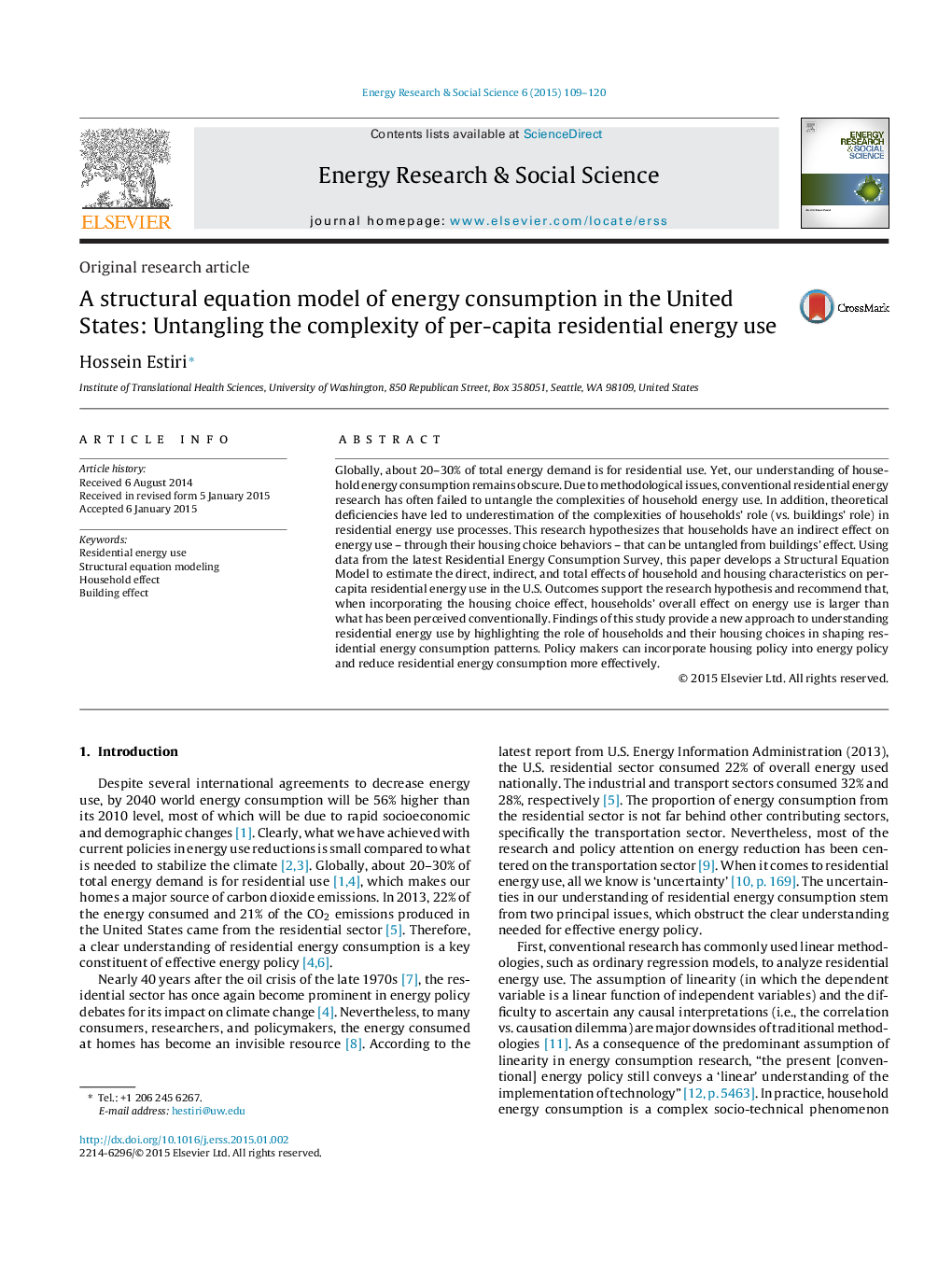| کد مقاله | کد نشریه | سال انتشار | مقاله انگلیسی | نسخه تمام متن |
|---|---|---|---|---|
| 6558903 | 161868 | 2015 | 12 صفحه PDF | دانلود رایگان |
عنوان انگلیسی مقاله ISI
A structural equation model of energy consumption in the United States: Untangling the complexity of per-capita residential energy use
ترجمه فارسی عنوان
یک مدل معادلات ساختاری مصرف انرژی در ایالات متحده: گسترش پیچیدگی مصرف انرژی شهری در سرانه
دانلود مقاله + سفارش ترجمه
دانلود مقاله ISI انگلیسی
رایگان برای ایرانیان
کلمات کلیدی
استفاده از انرژی مسکونی، مدل سازی معادلات ساختاری، اثر خانگی، تأثیر ساختمان،
ترجمه چکیده
در سراسر جهان، تقریبا 20 تا 30 درصد کل تقاضای انرژی برای استفاده در منازل است. با این حال، درک ما از مصرف انرژی خانوار کم و بیش باقی مانده است. با توجه به مسائل روش شناختی، تحقیقات انرژی مسطح متعارف اغلب نتوانسته است پیچیدگی های مصرف انرژی خانوار را از بین ببرد. علاوه بر این، کمبود های نظری منجر به کم پیش بینی پیچیدگی های نقش خانوار (در مقابل نقش ساختمان ها) در فرایندهای استفاده از انرژی های مسکونی می شود. این تحقیق فرض می کند که خانوارها تأثیر غیرمستقیم بر مصرف انرژی - از طریق رفتار انتخابی مسکن - که می توانند از اثر ساختمان ها بیرون بیایند. با استفاده از داده ها از آخرین بررسی مصرف انرژی مسکونی، این مقاله یک مدل معادلات ساختاری برای تخمین اثرات مستقیم، غیر مستقیم و کل ویژگی های خانوار و مسکن بر مصرف انرژی شهری در سرانه در نتایج ایالات متحده را پشتیبانی می کند از فرضیه تحقیق و توصیه می کند که ، هنگامی که ترکیب اثر انتخاب انتخاب مسکن، اثر کلی خانه ها بر مصرف انرژی بزرگتر از آنچه که به طور معمول درک شده است. یافته های این مطالعه یک رویکرد جدید برای درک استفاده از انرژی های مسکونی با برجسته کردن نقش خانوارها و انتخاب مسکن آنها در شکل دادن الگوهای مصرف انرژی مسکونی است. سیاستگذاران می توانند سیاست مسکن را در سیاست انرژی و مصرف انرژی مسکونی به طور مؤثرتری ادغام کنند.
موضوعات مرتبط
مهندسی و علوم پایه
مهندسی انرژی
انرژی (عمومی)
چکیده انگلیسی
Globally, about 20-30% of total energy demand is for residential use. Yet, our understanding of household energy consumption remains obscure. Due to methodological issues, conventional residential energy research has often failed to untangle the complexities of household energy use. In addition, theoretical deficiencies have led to underestimation of the complexities of households' role (vs. buildings' role) in residential energy use processes. This research hypothesizes that households have an indirect effect on energy use - through their housing choice behaviors - that can be untangled from buildings' effect. Using data from the latest Residential Energy Consumption Survey, this paper develops a Structural Equation Model to estimate the direct, indirect, and total effects of household and housing characteristics on per-capita residential energy use in the U.S. Outcomes support the research hypothesis and recommend that, when incorporating the housing choice effect, households' overall effect on energy use is larger than what has been perceived conventionally. Findings of this study provide a new approach to understanding residential energy use by highlighting the role of households and their housing choices in shaping residential energy consumption patterns. Policy makers can incorporate housing policy into energy policy and reduce residential energy consumption more effectively.
ناشر
Database: Elsevier - ScienceDirect (ساینس دایرکت)
Journal: Energy Research & Social Science - Volume 6, March 2015, Pages 109-120
Journal: Energy Research & Social Science - Volume 6, March 2015, Pages 109-120
نویسندگان
Hossein Estiri,
